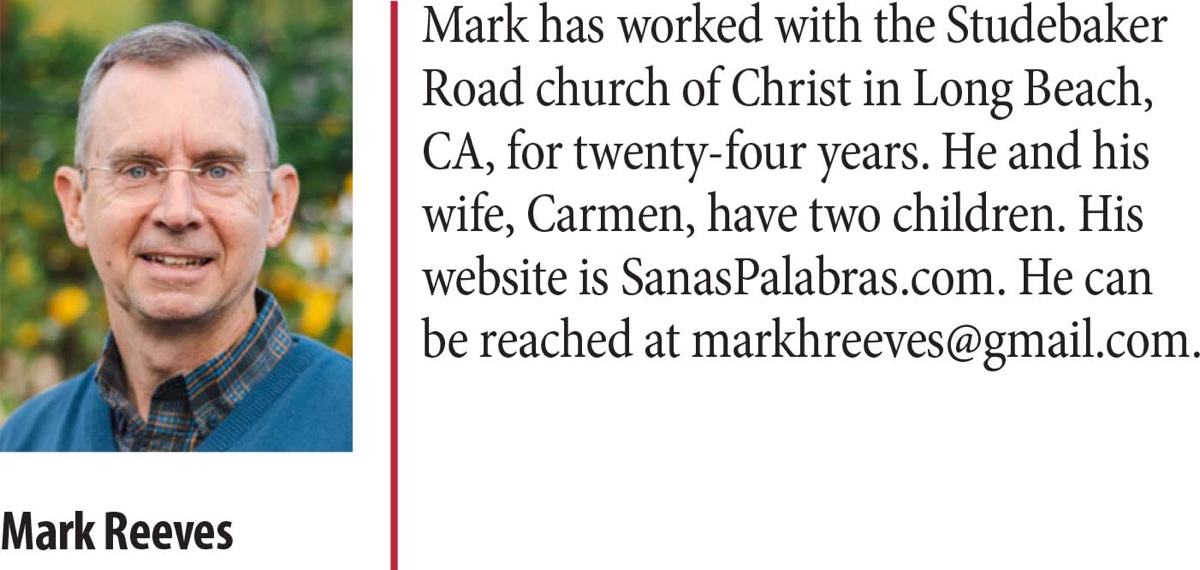by Mark Reeves
Synopsis: In recalling Christ’s ministry, we better appreciate how He lived free from sin, that His miracles proved His divinity, and that His mission was to seek and save the lost.
Sometimes we wish we knew more of Jesus’s thirty-some-odd years on this earth. Yet, the Holy Spirit chose to record His sinless life, the miracles He performed, and His mission to save the lost. Let’s recall some important aspects of His earthly ministry.
At the very beginning of His public ministry, Satan comprehensively tempted Jesus regarding the lust of the flesh, the lust of the eyes, and the pride of life (Matt. 4:1-11; cf. 1 John 2:16). Jesus did not succumb. At the end of His ministry, there existed the temptation to avoid the cross (Mark 14:36), which could have been accomplished through legions of angels (Matt. 26:53). Rather than fall, He prayed, “yet not My will, but Yours be done” (Luke 22:42). So it was throughout His ministry—Jesus never gave in to sin.
Jesus challenged others to quit sinning (John 5:14; 8:11), but only after first submitting Himself to the same scrutiny. “Which one of you convicts Me of sin? (John 8:46), He asked of His opponents. As Jesus was being tried, He posed the challenge,”If I have spoken wrongly, testify of the wrong; but if rightly, why do you strike Me? (John 18:23). In none of these instances do we hear a “peep” from His adversaries! Jesus could make such confident assertions because “in Him there is no sin” (1 John 3:5). Sin is inconsistent with His nature, and also should be with His disciples (3:3-10)!
He avoided sin by resisting the siren call of popularity and earthly grandeur (John 6:14-15), and not entrusting Himself to men (2:24-25). He prayed often, knowing that “the spirit is willing, but the flesh is weak” (Matt. 26:41). He filled Himself with Scripture in order to slay temptation as with a sword (Matt. 4:4, 7, 10; cf. Eph. 6:17; Heb. 4:12; Rev. 1:16).
Because He lived a sinless life, at His “trial” they had to work hard to obtain testimony against Him, and even so, they were unsuccessful (Mark 14:55). The Sanhedrin summoned false witnesses, but their testimony was inconsistent (14:56). An objective outsider, Pilate, the Roman governor, examined the case and announced Jesus’s innocence no less than three times (Luke 23:4, 14, 22)! Pilate’s wife added her testimony (Matt. 27:19), and even Judas confessed that he had betrayed “innocent blood” (Matt. 27:4). Alas, it wasn’t any flaw in Jesus’s character that put Him on the cross—rather, it was the Jews’ envy (Matt. 27:18), Pilate’s cowardice (cf. Mark 15:15; John 19:12-16), and a mob mentality (Mark 15:11; Matt. 27:24; Luke 23:23)—all occurring by God’s predetermined plan (Acts 2:23; 3:18; 4:28). No wonder Jesus could, with His dying breath, calmly say, “Father, into your hands I commit My spirit” (Luke 23:46).
Peter states plainly that Jesus “committed no sin” (1 Pet. 2:22). The Lord Himself asks His disciples to follow His example (John 13:15; cf. 1 Cor. 11:1). When we remember Jesus’s sinless life, let’s renew our resolve to remove sin from ours!
When we remember Jesus, we need to remember the miracles He did, because they powerfully demonstrate His deity. Jesus Himself was so confident in their force to produce belief that He said, “If I do not do the works of My Father, do not believe Me” (John 10:37). He laid it on the line. He asks no one to believe in Him just because He says so. In essence, He says, “Look at the miracles that I perform.” When the unbiased do, they proclaim with Nicodemus, “No one can do these signs that You do unless God is with him” (John 3:2). It’s that simple. You would have to come with a predisposition against them to not be moved by them.
We remember the vast diversity of Jesus’s miracles over the realm of nature (walking on water, calming winds, turning water into wine), over the human body and physical malady (healing the mute, deaf, blind, paralyzed, and others), over the demonic realm (casting out demons), and over life itself (resurrecting the dead). In contrast, the modern “faith healer” appears to be more of an “internal medicine specialist,” treating only “illnesses” that cannot be verified. Consider the contrasting characteristics of Jesus’s miracles:
Immediate (Mark 1:42; 2:12)
Diverse (Mark 1:34)
Complete (Mark 1:31b, 44; 2:12)
The inspired gospel writer John said he recorded Jesus’s “signs” so that we might “believe that Jesus is the Christ, the Son of God; and that believing you may have life in His name” (John 20:30-31). Let’s look and live!
When we remember Jesus, we will recall His spiritually focused mission. He was sent into the world to save it (John 3:17) and give it abundant life (10:10). So, at His birth, heaven announced that He would be a “Savior” (Luke 2:11). He lived His entire life to give it “a ransom for many” (Matt. 20:28). Between His birth and the cross, He came “to seek and to save that which was lost” (Luke 19:10).
He did that personally, while here on earth. So, when He conversed with a woman of another race and culture about water at a well, He eventually turned the conversation to spiritual things so that she might have eternal life (John 4:14). It could have been a despised tax-collector, like Zacchaeus (Luke 19:1-10), a pagan centurion (Matt. 8:5-13), or an outcast leper (e.g., Luke 17:11-19); no matter the person, Jesus was always willing to provide for his physical need while pointing out that faith in Him is the key to spiritual healing.
He also did that indirectly by teaching His followers to seek the lost after His return to heaven. Consider Matthew chapter 18. Even here, where His teaching can seem harsh to us, we observe His concern for the lost. He begins by teaching us not to be a source of stumbling to others (vv. 6-7), or to oneself (vv. 8-9). Even the drastic “self-amputation” that Jesus recommends (vv. 8-9) is for the purpose of saving one’s life! Is Jesus concerned about just one person being lost, or is He not too disturbed until there are many in danger of perdition? The illustration of the one lost sheep (vv. 12-14) would forever answer with a resounding just one! “Church discipline” (vv. 15-20) is to “win,” that is, save the sinning brother, or at least save the church from his influence. In Peter’s question and Jesus’s response through a parable, we learn of the elements needed to prevent oneself or one’s brother from being lost: remembering our own forgiveness (vv. 32-33) and a willingness to forgive others (v. 35) as often as necessary (v. 22).
Jesus was not only on a mission to save—He was focused on it. To teach someone the good news was in fact His “food” (John 4:34). Remember how He began each day before sunrise (Mark 1:35) and continued working late after sunset (1:32)? When folks were clamoring for more from Him, He had the concentration politely to refuse: “Let us go somewhere else to the towns nearby, so that I may preach there also; for that is what I came for” (Mark 1:38).
Paul asked Timothy to remember Jesus Christ (2 Tim. 2:8) for practical reasons. So, as we remember Jesus’s sinless manner of life, let each of us make every effort to purify “himself, just as He is pure” (1 John 3:3-5). As we recall Jesus’s miracles, let’s allow them to produce a world-conquering faith in us (1 John 5:4). When we harken back to Jesus’s spiritual mission, may we make it ours—to look beyond this material world and seek salvation for ourselves and those around us (cf. 1 Tim. 4:16).


